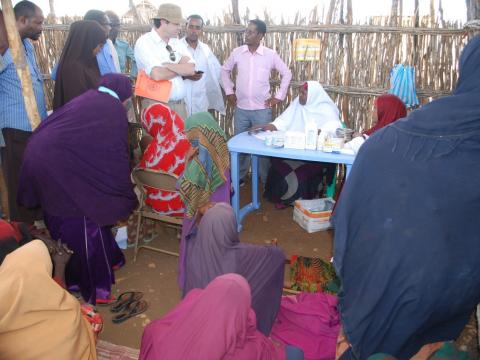Mobile Clinics brings relief to displacement camps in Baidoa

OFDA funded mobile clinics are bringing much needed help to thousands of people who are trapped in displacement camps in and around Baidoa town in South Central Somalia.
The mobile clinic program was started in July 2014 in partnership with World Vision and a local organization, DMO (Degroor Medical Organization).
The new facility brings the much needed help to Baidoa, a town that has become a gathering point for people fleeing conflict and drought conditions throughout south central Somalia. It is estimated that there are 77 displacement settlements throughout Baidoa town.
World Vision through DMO is supporting five (5) health teams. The teams have strategically sited their thatched roof clinics on the borders of the different settlements, sending out community health workers five days a week. These static and mobile teams provide support to 20 displacement settlements in southeast Baidoa.
Kevin Mackey, World Vision’s Operations Director recently visited the sites accompanied by DMO Mariam Hassan Noor, DMO Executive Director.
At Idale, one displacement camp, three kilometres from Baidoa town approximately 500 households (3000 people) are being supported. Here, Mohammed Noor Hassan, DMO Nurse Team Leader estimated that the diagnosis and vaccination teams see about 35 patients per day with most common illnesses being Diarrhea, urinary tract infection and acute respiratory infection.
Noor explained that his team keeps detailed registers, diagnosis and treat patients who visit the clinic. He also mentioned how his team screen for malnutrition with IDP children and pregnant and lactating women and refers them to World Vision/WFP supported TSFP and BSFP programming implemented by DMO.
Kevin Mackey, WV Operations Director and Mohammed Noor Hassan, DMO nurse team
Later, Mr. Mackey chatted with Marian Muridi, DMO Midwife who noted that the antenatal and postnatal clinic sees between 20 and 40 women per day. She is there to provide support and information to young mothers. She also screens pregnant and lactating women for vitamin deficiencies and malnutrition, referring them to World Vision/WFP support feeding programs at DMO food distribution sites.
Marian, who also provides women of childbearing age vaccination to tetanus also noted that life is difficult for mothers in IDP camps – there are high incidents of anemia, urinary tract infections, and sexually transmitted infections.
She remarked that many of these issues are difficult for women to discuss openly, and requested if a separate thatched roof shelter could be built to allow her to have more discreet conversations with her patients.
In Somali society, issues dealing with sexual transmitted infections are highly sensitive. However, left untreated these pose risk to both mother and child. Many families will not accept that their mothers and daughters have these illnesses. Moreover, it is difficult to convince husbands to seek treatment to protect their other wives from similar infections. It is important for grassroots organizations like World Vision and DMO to promote knowledge of these infections, but also too, to provide caregivers and patients venues opportunities for these types of information exchanges. Experience has shown that it takes time to engage with families about such sensitive topics, like sexually transmitted infection, persuade them to take appropriate actions to protect the health of their families. Thanks to emergency funding from OFDA, WV and its partner DMO are able to bring health services closer to the communities we serve.
Mobile teams are helping to reach out in 20 IDP settlements, getting the word out about issues which impact the safety of mothers and children. Programs like these help ensure that even in locations of insecurity, families have access to health services to help build strong families. Strong, healthy families are the foundation for a strong and healthy society.